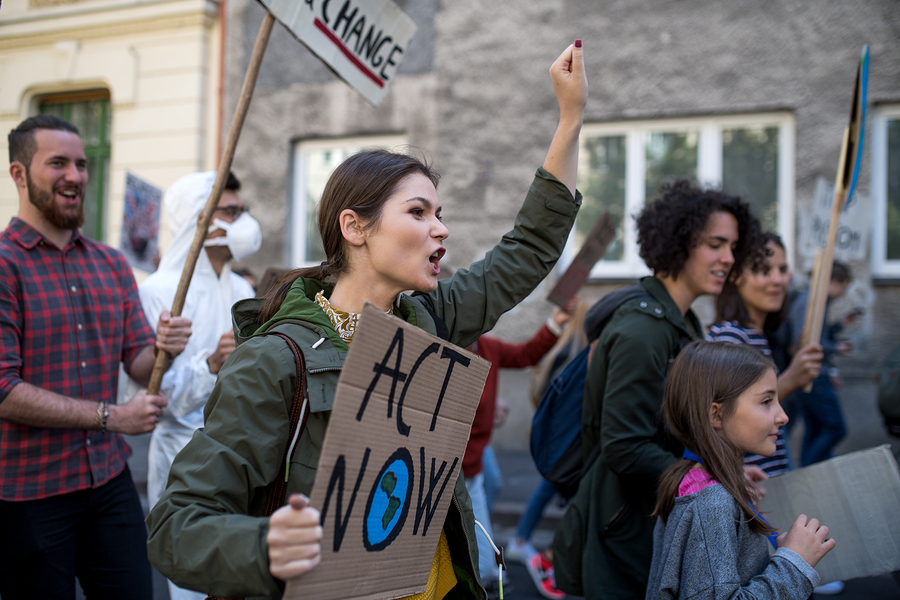Jan 20, 2020 | Constitutional Rights

The First Amendment is well-known to cover what we call “freedom of speech.” It means that every individual has the right to express an opinion and be free from government censorship, even if not everyone agrees with it. We discussed the First Amendment as it relates to blogging in a post in 2018.
But freedom of speech doesn’t always include the spoken word. In fact, freedom of speech and expression can take a number of non-verbal forms. These are known as symbolic speech, actions that express specific ideas.
Defining symbolic speech
Non-verbal symbolic speech is the action clearly conveys a specific message to anyone who sees and reads it. Symbolic speech can take the form of:
- Public protests, such as sit-ins and marches
- Demonstrations
- Wearing buttons, armbands or other clothing items (such as t-shirts) that deliver a protest or other specific message
- Nudity
- Flag waving
- Flag burning
- Burning draft cards
The government must have an important reason and prove to a court that the message isn’t protected speech should be punished. Government disapproval cannot be the reason. But like fighting words, not everything is protected speech.
The limits on freedom of speech and protected speech
What freedom of speech does not mean is that you can say whatever you want without consequences. The fighting words doctrine includes speech or words that intentionally incite violence or cause distress, are not protected. Slander (lying), obscenity, child pornography and obscene gestures are also not protected as free speech.
Two examples of symbolic speech
One example of these limits occurred during the Vietnam War. Students at two Des Moines, Iowa schools decided to wear black armbands to school as a silent protest to the war in Southeast Asia. Once the principals discovered the plan, they warned students that anyone wearing the armbands would be suspended. Three students were suspended as a result.
Parents of these children sued, and the US District Court sided with the Southern District of Iowa sided with the school. The students lost on appeal, so they took the case to the Supreme Court.
The case of Tinker v. Des Moines Independent Community School District brought the case to the Court to decide that students did indeed have the right to free speech at school. However, in this instance, the school was correct in prohibiting them to avoid disrupting learning at the school, and they had the right to do so.
Another famous example of symbolic speech is the case of Texas v. Johnson, in which a man burned an American flag outside of the 1984 Republican National Convention. He chose to burn it there, where Ronald Reagan was about to receive the nomination to run for president, to protest Reagan’s policies. Soaking an American flag with kerosene in front of the Dallas City Hall, he set fire to it, and immediately arrested for violating a Texas state law prohibiting the burning or desecration of an American flag. He served a year in jail and paid a fine.
The Texas Court of Criminal Appeals is the state’s highest appeals court for criminal cases. They argued that symbolic speech was protected by the First Amendment, and overturned his conviction. This led the way to a Supreme Court hearing in June 1989 that produced a controversial 5-4 ruling that burning the flag is, in fact, protected speech. The justices called it a bedrock principle that the government could not just prohibit an expression of speech just because society finds it offensive.
The First Amendment protects your right to freedom of speech
If someone has threatened your right to free speech, you can fight back. Call the Civil Rights Litigation Group at (720) 515-6165, or use our online contact form, to schedule your free consultation with us today. We understand civil rights cases, and aggressively defend you in court and make sure your rights are protected.
Oct 17, 2019 | Constitutional Rights
Last year, we explained how the First Amendment affects bloggers. The laws and decisions that go into protecting bloggers may also affect rights regarding the first amendment and social media postings.
You may have encountered virulent arguments on social media about topics that should not have provoked that type of reaction. At some point, you or someone else may be accused of and reported for promoting “hate speech.” Maybe you just stated an opinion, and someone shot back an inflammatory comment. Does First Amendment cover you?

Defining hate speech
“Hate speech” isn’t a legal term, but is one used to describe speech that’s intended to attack or demean another individual or group. This type of speech is usually based on characteristics that are illegal to use for discrimination, such as race, sex, religion, nationality, sexual orientation, or age.
Hate speech has also come to mean any type of comment that another individual does not agree with, even if it’s not specifically insulting or demeaning.
Simply hurling insults at someone is offensive, but not against the law. But hate crimes, targeting someone because of the above characteristics, are a matter of criminal law, not civil.
What is social media?
Websites, apps and other forms of electronic communication allow people to communicate and share content in real time. Most people are familiar with Facebook, Twitter, Instagram, Pinterest, YouTube, and similar websites, as well as professional networking site Linkedin. Depending on the platform, you can disseminate any type of information to your friends, private groups or the user community at large.
When a post, picture, or other piece of content “goes viral,” it’s shared widely and occasionally appears in broadcast media. This can be anything from a cute cat video to a vicious diatribe targeting a group of individuals, and anything in between. With a combined social media user community in the billions, one share can put your post in front of the entire world in the blink of an eye.
While many social media users share pictures of whatever they’re doing, eating, drinking, or watching, hate groups use the same medium to disseminate their own messages. This is where the First Amendment and social media come into play.
The difference between the First Amendment and social media
Hate groups from all over the world have routinely used social media to spread their message, recruiting and bringing more people into their fold. The recent attack on a German synagogue was live-streamed on Twitch by the shooter wearing a helmet camera. But it wasn’t the first time social media has been used to broadcast such an event.
While the First Amendment protects your right to say what’s on your mind in a public forum, social media is a different matter. The platforms might be a public forum, but are privately owned by companies that issue their own policies for what you can and can’t say there.
For instance: standing in the public square and shouting insults will upset people of that you’re targeting, but the comments are constitutionally protected. However, threats of and encouraging violence, the so-called “fighting words,” are not constitutionally protected, and may also get you arrested.
Platform policies
Making the same comments on social media may be First Amendment protected, but may violate the platform’s “community standards.” This means that although your comments are constitutionally protected, the platform itself does not have to allow you to say it on their “premises.”
It’s akin to saying something insulting to someone in their own home. You can say it on the sidewalk, but they don’t have to allow you in to say it in the privacy of their living room. By the same token, social media companies have the right to tell you that you can’t say that on their privately owned platform. Users are allowed to “flag” comments that they believe to be hate speech, but flags are also used in retaliation for benign comments that someone simply disagreed with. This makes it more difficult to find true hate speech and combat it.
While social media companies have broad powers to restrict hate speech in their platforms, their capacity is lacking to catch and control everything that violates their community standards.
Have you been accused of hate speech?
Call the Civil Rights Litigation Group at (720) 515-6165, or use our online contact form, to schedule your free consultation with us today. As a civil rights defense firm, we will work to ensure that your civil rights are defended and protected.
Sep 26, 2018 | Civil Rights Law
Police have specific guidelines when they go out to search a home, or if you’re stopped in a car. Sometimes, procedures aren’t followed. The Fourth Amendment protects you from illegal search and seizure.

How you’re protected
The Fourth Amendment states that “[t]he right of the people to be secure in their persons, houses, papers, and effects, against unreasonable searches and seizures, shall not be violated, and no warrants shall issue, but upon probable cause, supported by Oath or affirmation, and particularly describing the place to be searched, and the persons or things to be seized.” The State of Colorado also has a similar statute in the state constitution. Police can’t just search your car or home for no reason.
Why police might search
While the Fourth Amendment covers searches that are “unreasonable,” there are times when a search may be considered “reasonable.” Should the police believe they have probable cause to search you, your home, your car, or anything else connected to you, the search is because they believe they can find evidence to prove that you committed a crime. Generally, there is a search warrant issued and signed by a judge for this to happen.
Alternately, there may be extenuating circumstances that allow for a search to be executed without a warrant.
“Fruit of the poisonous tree”
Evidence obtained as a result of an illegal search can also be disqualified. This term was coined after a famous court case, Wong Sun vs. The United States. In this case, the prosecution introduced drugs into evidence that were discovered while in an interrogation during an illegal arrest.
For instance, if you are stopped by police for no reason, and the police find something that leads to hidden evidence (a note, a text, etc.) that they would normally not have found, the two parts equal an illegal search and seizure. The trail that leads them to it is the “tree,” and the evidence found as a result is the “fruit.”
This means that dismissals are two-fold. Charges filed against you as the result of an illegal action can be dismissed as well as any evidence because they were not properly obtained.
Defending yourself against illegal search and seizure
Police are not allowed to conduct searches because they feel like it, or because they “thought there might be something.” If the police come to your door and ask to search the place, you have the right to ask for a warrant. If they believe they have probable cause, you will likely get a return visit from them with one. However, if they have probable cause to conduct a warrantless search and are intent on searching anyway, you may have no choice. Verbally inform them that you do not consent (loudly if there are possible witnesses), but do not interfere with them.
Police can only search whatever is described in the warrant. For instance, if the warrant allows a search of your house, searching a potting shed may be considered an “illegal search.” They are only allowed to seize what’s allowed in the warrant. Searching for and finding something else not described in the warrant may also be “illegal,” but not necessarily.
Hiring a civil rights attorney is your best defense against a 4th Amendment violation.
Should the police violate your civil rights with an illegal search and seizure, you can sue for monetary damages under what’s known as a “1983 action.” The section of the US Code (42 U.S.C. §1983) that covers 4th Amendment violations is where the name comes from, and it’s used to define illegal search and seizure, as well as other civil rights. A skilled civil rights attorney can file charges and proceedings and guide you through the process.
If you are charged with a crime using evidence that is obtained through an illegal search, a civil rights attorney can file a motion to suppress the evidence. If the motion is successful, the evidence, and possibly the case, may be thrown out completely.
NOTE: Even if a search or arrest is illegal, resisting or physically fighting an officer can still result in charges of resisting arrest — a separate charge from the original, wrongful arrest that probably won’t be dismissed. DO NOT resist an arrest, no matter how illegal.
Defend your rights — call today
If you’ve been a victim of an illegal search and seizure, you need an attorney experienced in civil rights cases.
Call the Civil Rights Litigation Group at (720) 515-6165, or use our online contact form, to schedule your free consultation with us today. We understand civil rights cases, and aggressively defend you in court and make sure your rights are protected.
Mar 26, 2018 | Civil Rights Law
The First Amendment Defense Act (FADA) was introduced in 2016 in response to numerous cases of individuals and businesses being legally sanctioned (including steep fines) for declining to participate in same-sex weddings and related activities. Some call it needed, some call it unconstitutional, with staunch opponents claiming it will dissolve all rights currently available to LGBT individuals.

The bill was introduced into the House of Representatives on 6/17/2015 (H.R. 2802) by Rep. Raul Labrador (R-ID). On the same day, it was referred to two committees, the House Ways & Means and House Oversight and Government Reform, but has not yet been reviewed or considered by either one. Even with 172 co-sponsors, this bill has not actually gone anywhere since its introduction. The same bill (as S.1598) was introduced into the Senate by Senator Mike Lee (R-UT) and has 37 cosponsors there.
Both senators, in response to criticism, updated both versions of the bill and put them on their websites, but haven’t introduced them into Congress. For the time being, the First Amendment Defense Act isn’t going anywhere.
Many defendants of the LGBT community claim that FADA will not only roll back civil rights for them but also allow religious discrimination against them, just for being gay. But does it?
What the First Amendment means
The actual First Amendment says:
Congress shall make no law respecting an establishment of religion, or prohibiting the free exercise thereof; or abridging the freedom of speech, or of the press; or the right of the people peaceably to assemble, and to petition the Government for a redress of grievances.
What it means seems to always be up for interpretation, and despite multiple Supreme Court decisions, it’s not always the same. But in essence, the First Amendment gives American citizens the right to free speech. It was created after laws in the British Commonwealth allowed members of minority parties to be jailed for speaking out. The First Amendment allowed political dissenters to be free from the same fate in the newly created United States.
It’s important to note that not all speech is free speech under the First Amendment. The Supreme Court has identified areas that, under certain circumstances, can be restricted:
- Speech that incites illegal activity and subversive speech
- Fighting words
- Obscenity and Pornography
- Commercial speech
- Symbolic expression
Freedom of the Press
This part of the First Amendment permits the free distribution of information, ideas, and opinions without constraint, prosecution and interference from the government. There are some restrictions, including things like defamation. Freedom of the press has expanded in recent years to include bloggers. However, bloggers can still be held liable for copyright and/or trademark infringement and defamation.
Freedom of Religion
Born out of the heavy-handed influence by the Anglican Church in England, Thomas Jefferson sought to keep religious over-reach out of the government in the new colonies. He opposed a church’s influence and interference in governmental affairs, and the establishment of a “national religion.” While the high courts continue to debate how it works, this clause establishes the rights of each individual to worship the faith they prefer and as they see fit.
What the First Amendment Defense Act does
So how would the First Amendment Defense Act affect a civil rights case? While it’s currently still just a bill stalled in a committee, the short version is, “To prevent discriminatory treatment of any person on the basis of views held with respect to marriage.” It’s aimed at protecting people based on their religious beliefs when those beliefs conflict with a client or customer in regards to marriage. The bill’s summary states that it would prohibit the federal government from taking action against a person:
“on the basis that such person believes or acts in accordance with a religious belief or moral conviction that: (1) marriage is or should be recognized as the union of one man and one woman, or (2) sexual relations are properly reserved to such a marriage.“
The bill was created in response to a number of Christian businesses who declined to provide various wedding-related services to same-sex couples. The most famous of these was in Oregon, involving a bakery called Sweet Cakes By Melissa, and two women who had patronized the bakery previously. When the owner’s husband discovered that the wedding cake was intended for a same-sex wedding, he informed them that they would not be able to make that cake, citing religious beliefs. The couple brought legal action in the state of Oregon and won. Since then, the bakery has been fined $135,000 and closed its doors. Other businesses in similar circumstances have been fined, sued or otherwise sanctioned.
The First Amendment Defense Act gives businesses federal protection to businesses and religious organization decline a customer’s business or requests based on their religious beliefs. The business would be neither persecuted nor prosecuted.
How does the First Amendment Defense Act affect a civil rights case?
Opinions differ, but it also depends on what side you’re on.
Authors and supporters of FADA believe it will allow businesses and religious organizations (including religious-based businesses such as Catholic colleges and hospitals) to operate in accordance to their beliefs free from recrimination. In the many cases of small, Christian businesses whose owners disagree with same-sex marriage, it gives them an “out,” if they so choose, allowing them to decline the business without fear of government sanctions or harassment.
The First Amendment Defense Act would, in theory, protect the civil rights of individuals who have expressed belief in traditional marriage. It would also allow state clerks to recuse themselves from issuing licenses for same-sex marriage if they desire, as well as prevent job loss after voicing discontent outside of their work environment. The bill is designed as a balance to protect religious liberty while also respecting the rights of the LGBT community.
Opponents believe that FADA will allow religious organizations and businesses to openly discriminate against the LGBT community without retribution. They also believe that FADA would undermine the government’s ability to enforce federal protections for LGBT individuals, and all anyone would have to invoke “marriage beliefs” to be immune from prosecution. The ACLU lists in this fact sheet that FADA would open up additional discrimination against single mothers and unmarried straight couples as well. By allowing certain types of discrimination to go unpunished, it’s possible that same-sex couples could be denied things such as housing, education, health insurance and medical care (including the right to utilize the Family Medical Leave Act for an ill spouse.)
At this point, however, the First Amendment Defense Act is still a bill that’s stalled in committee and is not the law of the land.
We defend your civil rights
If you’ve been discriminated against for any reason, call the Civil Rights Litigation Group in Denver at (720) 515-6165 for a free consultation. We’re experienced in helping people just like you fight back against denial of your civil rights. We’ll review your case, help you file your complaint, and represent you in court when the time comes.
Aug 24, 2017 | Police Misconduct, Uncategorized
Many police officers exercise restraint when handling members of the general public, but there are times when a situation gets out of control. The law allows the police some flexibility when dealing with or handling an uncooperative individual. Deadly or excessive force can be used if the officer feels he or she is being threatened with it (i.e., a gun pointed in the officer’s direction.) But if physical force is unwarranted, and it’s used anyway, it may be excessive force, and a violation of one’s civil rights. What can you do when you’ve witnessed police using excessive force? The Civil Rights Litigation Group has handled many of these kinds of cases and can help you as well.

Is it excessive force?
The police have qualified immunity involving arrest, so concerns of legal action don’t interfere with their ability to do their jobs. Police are allowed to use reasonable force when handling a combative individual, but only to the point of subduing the person for arrest. Legal protections for citizens are available if force becomes excessive or unreasonable. Section 1983 of the Civil Rights Act of 1871 forbids the police to restrict an individual of their civil rights under the Fourth Amendment of the Constitution.
Excessive force is a general term used when a police officer is aggressive, forceful, and possibly threatens bodily harm when it’s unnecessary. For instance, if someone has cooperated with the police, either at a traffic stop, or during an arrest, (i.e., handcuffed and compliant), physical force or a weapon wouldn’t be necessary to restrain the individual. Continuing to physically subdue the individual after he or she has complied may graduate into the grey area of excessive force, particularly if the end result was severe injury or death.
Keep quiet!
If you are the victim of excessive force, don’t answer any questions that aren’t required (i.e., like your name.) Don’t speak unless absolutely necessary, such as asking for an attorney. If you have injuries from the police, request medical attention immediately. Don’t yell, become combative, threaten to sue, or say anything else about civil rights. Use your right to remain silent, because what you say really will be used against you later.
Gather evidence and build your case
You will have to prove your case of excessive force with facts and evidence. You need to work quickly, since police may begin erasing evidence and attempting to cover facts.
1. Immediately create a written record of the event. Document everything, including day, time, circumstances, witnesses and anyone who was with you. Don’t worry about formatting—you’re just documenting and organizing everything, and putting together a timeline to establish facts; you can format and summarize when you present it to your attorney. Once you’re in court, you will be required to tell your story, clearly and exactly. Written and coherent documentation of the events will help your case.
2. Gather physical evidence. Pictures, video, a police report or citation, medical records (if required), any damaged property (i.e., torn clothes or damaged shoes) and anything else that’s relevant is evidence.
a. If you were injured, take pictures of your injuries and save them in a safe place (i.e., online photo storage, not just on your phone or hard drive.)
b. Take pictures of any damaged personal property, and put the items away for safe keeping until they are needed.
3. Gather witnesses’ contact information. Witnesses who can verify and validate your story is crucial. An attorney may request a signed witness statement from them detailing what they saw. You need to document these facts as quickly as possible.
4. Take care of yourself first. If you were denied medical care in custody, you’ll need to get it now. If you were charged with a crime, you’ll also need to find a defense attorney and take care of it. Document everything, including time off work, legal fees and other details.
5. Talk to an attorney who specializes in civil rights violations by police. An experienced civil rights attorney can examine your case, help you file the appropriate complaints and work with you through the entire process.
What if I witness police using excessive force against another individual?
If you are a witness to police using excessive force, immediately document what you see, in as much detail as you can. Write down the time, date, place, names if you can get them, and any other relevant details you can remember. If you can take pictures or video, do so, and save them somewhere. Recalling the incident and going over it helps you remember specific details. You may be called upon by an attorney to give testimony later, and a written account will go a long way in proving excessive force.
Protect your civil rights in Denver
An experienced civil rights attorney is essential to handling a case against police. If you’ve been the victim of police excessive force in Denver, contact the Civil Rights Litigation Group at (720) 515-6165 today for a free consultation.





